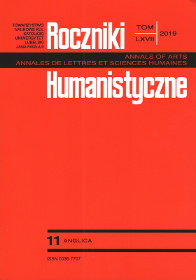Rape Culture Reborn: A Posthuman Perspective on Rape in Westworld
Abstract
The main objective of the essay is to present the problem of granting the status of a person who enjoys all human rights to artificial intelligence if it manages to develop artificial consciousness at the level allowing it for reflecting upon itself and recognizing the fact that it is an entity which has its own subjectivity and the right not to be exploited. Assuming the perspective of critical posthumanism, which here draws on research conducted by Stefan Sorgner, Francesca Ferrando, and Neil Badmington, the Author tries to give a concise presentation of the issue, which may still be perceived as part of speculative discourse stimulated by science-fiction, but which – as the Author proves – seems to be gradually becoming part of our everyday world that humanity will have to deal with on both ideological and legislative ground.
References
“10 U.S. Code § 920 - Art. 120. Rape and sexual assault generally.” https://www.law.cornell.edu/uscode/text/10/920. Accessed 23 Aug. 2019.
“Artificial intelligence could one day make us feel awkward.” BBC Future. http://www.bbc.com/future/story/20161202-artificial-intelligence-could-one-day-make-us-feel-awkward. Accessed 03 Dec. 2016.
Aström, Berit, Katarina Gregersdotter, and Tanya Horeck, editors. Rape in Stieg Larsson’s Millennium Trilogy and Beyond. Contemporary Scandinavian and Anglophone Crime Fiction. Palgrave Macmillan, 2013. pp. 234.
Agamben, Giorgio. Homo Sacer. Sovereign Power and Bare Life. Stanford University Press, 1998.
Badmington, Neil (ed.). Posthumanism. Palgrave, 2000.
Brownmiller, Susan. Against Our Will. Men, Women and Rape. Fawcett Columbine, 1993.
Business Insider. http://www.businessinsider.com/westworld-season-one-finale-ratingsrecords-for-hbo-2016-12?IR=T. Accessed 08 Jan. 2016.
Descartes, René. “Discourse on the Method for Conducting one’s Reason Well and for Seeking the Truth in the Sciences.” Discourse on Method and Meditations on First Philosophy, Trans. Donald A. Cress, Hackett Publishing Company, Inc. 1998, pp. 1–44.
Fuller, Bryan. Creator. Hannibal. AXN Original Productions. 2013–2015.
Fukuyama, Francis. Our Posthuman Future. Consequences of the Biotechnology Revolution. Farrar, Straus and Giroux, 2002.
Haraway, Donna. “Science, Technology, and Socialist-Feminism in the Late Twentieth Century.” Simians, Cyborgs and Women: The Reinvention of Nature. Routledge, 1991, pp.149–181.
HBO official website. http://www.hbo.com/westworld/about/index.html. Accessed 08 Jan. 2016.
Matrix. Directed by The Wachowski Brothers. Performances by Keanu Reeves, Lawrence Fishburne, Carrie-Anne Moss, Hugo Weaving, and Joe Pantoliano. Warner Bros. 1999.
Melzer, Patricia. Alien Constructions. Science Fiction and Feminist Thought. University of Texas Press, 2006.
Nolan, Jonathan and Lisa Joy. Creators. Westworld. Kitler Films, Bad Robot Productions, Jerry Weintraub Productions, and Warner Bros. Television. 2016–.
Sommers, Christina Hoff. “Researching the ‘Rape Culture’ of America. An Investigation of Feminist Claims about Rape.” The Real Issue vol. 2, 1995, no. 6, pp. 1–13.
“Stefan Sorgner—Posthuman Perspectives.” YouTube. Uploaded by Question of Will, https://www.youtube.com/watch?v=9Vpb-uKfmPo. Accessed 20 Jan. 2016.
Walker, James. “Researchers Shut Down AI That Invented Its Own Language.” Digital Journal, 21 July 2017, http://www.digitaljournal.com/tech-and-science/technology/a-step-closer-to-skynet-ai-invents-a-language-humans-can-t-read/article/498142. Accessed 29 July 2017.
Wennemann, Daryl J. Posthuman Personhood. University Press of America 2013.
Westworld. Directed by Michael Crichton. Yul Bynner, Richard Benjamin, and James Brolin. Metro-Goldwyn-Mayer, 1973.
Wolfe, Cary. What is Posthumanism. Minneapolis, University of Minnesota Press, 2010.
Copyright (c) 2019 Roczniki Humanistyczne

This work is licensed under a Creative Commons Attribution-NonCommercial-NoDerivatives 4.0 International License.





